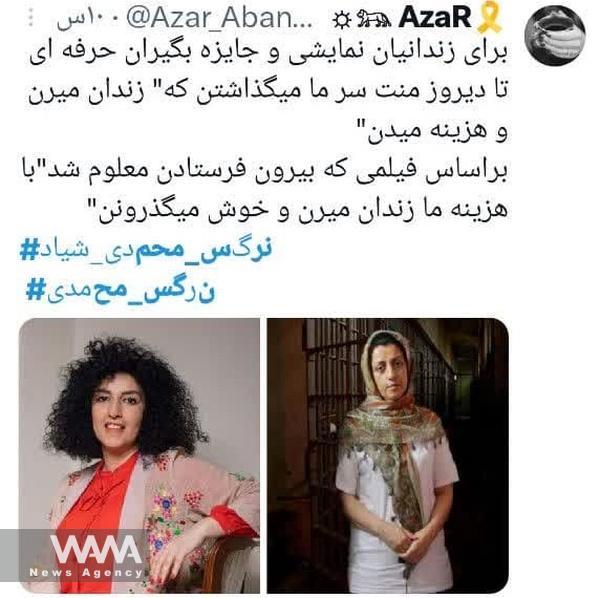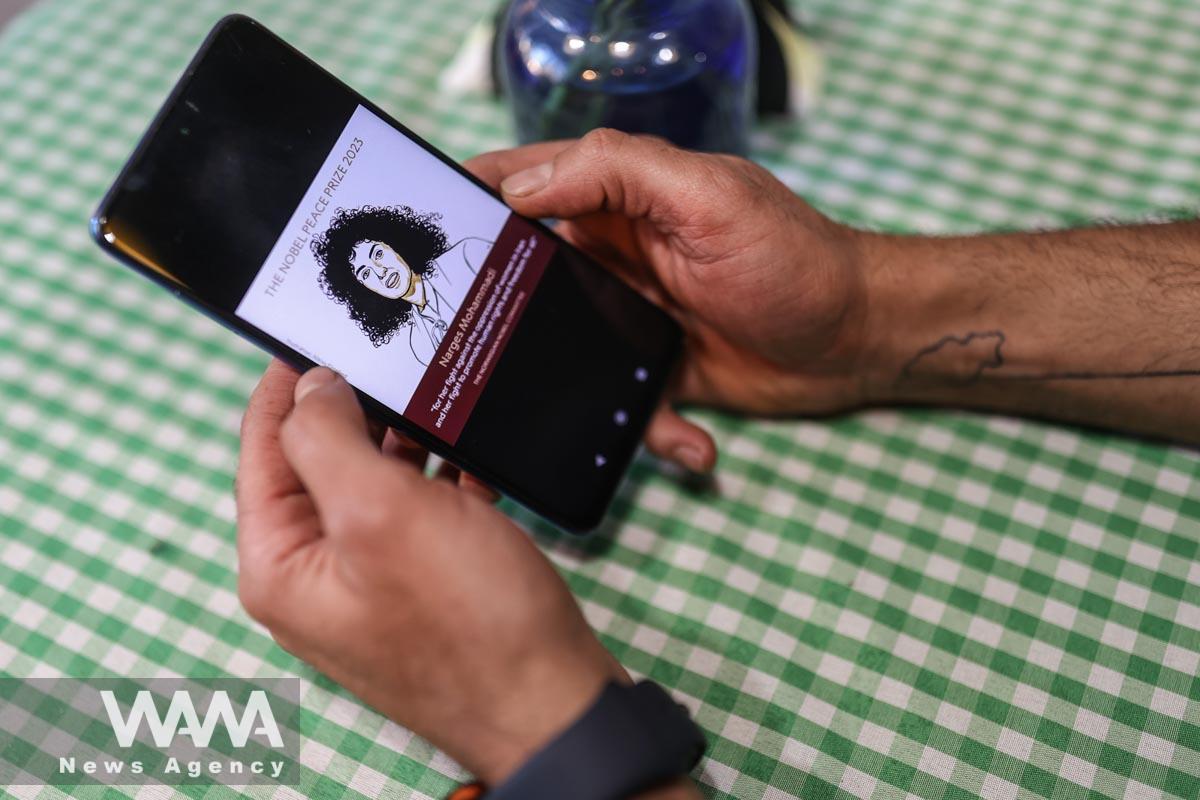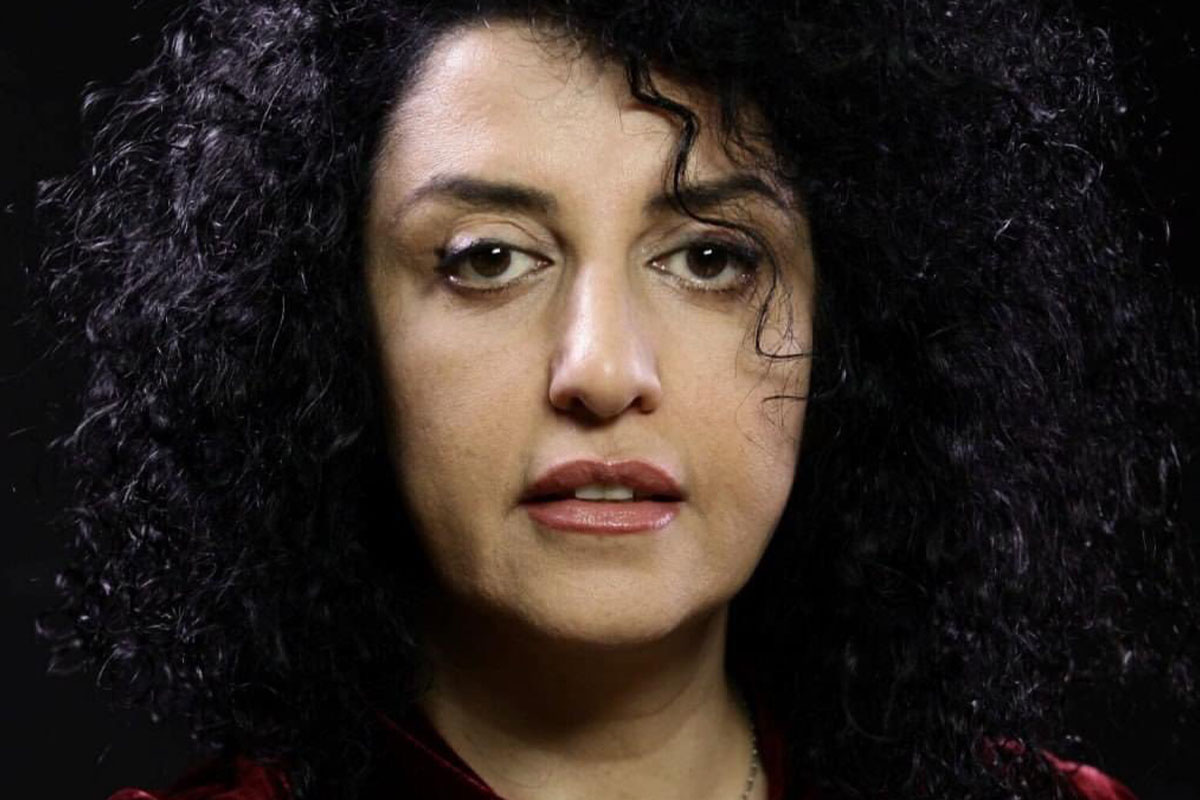Revelations from Inside Evin Women’s Ward
WANA (Feb 24) – The name Narges Mohammadi, the human rights activist and winner of the 2023 Nobel Peace Prize, has been prominent in Iran’s political landscape for years.
While she is portrayed as a symbol of resistance outside prison, accounts from within Evin Women’s Ward paint a starkly different picture—one not of a human rights defender but of an individual who, by creating a network of loyal inmates, has turned the ward into her own domain.
Recently, a former cellmate released a video that seemed to confirm these claims. The footage shows Mohammadi dancing energetically at a group celebration inside the prison.
However, just days later, when she was wheeled out on a stretcher for medical leave, her appearance—manicured nails, well-applied makeup, and stylish attire—stood in sharp contrast to the image of a tortured and oppressed prisoner that foreign media depict.
The images quickly became fodder for social media satire, with users joking, “She looks like she’s coming from a beauty salon, not from prison!” Many saw the video as evidence that her suffering was exaggerated.

An Iranian woman sees the news of Iranian activist Narges Mohammadi winning the Nobel Peace Prize on her mobile phone in a cafe in Tehran, Iran, October 6, 2023. Majid Asgaripour/WANA (West Asia News Agency)
Power and Control in the Women’s Ward
Former political prisoner and artist Atena Farghadani describes her experience of sharing a ward with Mohammadi: “When I entered the ward, I realized that power was concentrated in the hands of a select group who controlled others.
Mohammadi and a few others formed a circle where inmates were divided into two categories: those under their protection and those subjected to harassment.”
In a series of Instagram stories, Farghadani alleged that Mohammadi controlled the ward through intimidation and coercion, silencing her opponents.
She even accused her of orchestrating physical violence against certain inmates. Farghadani also claimed that Nasrin Sotoudeh, another imprisoned lawyer and activist, played a role in this power structure.
Privileges Behind Bars
A former prisoner, speaking anonymously, described the unusual environment in the women’s ward: “I repeatedly saw inmates being forced to run errands for Mohammadi and her close associates—cooking, cleaning, even giving massages. Protesting this treatment had serious consequences, including humiliation and social exclusion.”
These claims contradict the international narrative of harsh and inhumane conditions in Iranian prisons. Some reports suggest that not only is torture absent in the women’s ward, but it actually offers considerable privileges—from access to luxury food items to an unexpected supply of beauty products.
Instead of a place of punishment, the ward appears to be a battleground for power struggles among different factions.

A post on the social media platform X about Narges Mohammadi, an Iranian political prisoner, criticizing her behavior and videos that have been released, calling her a “performative prisoner.” / WANA News Agency
Victim or Mastermind?
Mohammadi’s supporters dismiss these allegations as a smear campaign orchestrated by security forces. However, some former inmates insist that she was not a victim but rather a manipulator who leveraged her position for dominance.
One of the most controversial aspects of this story is the claim that Mohammadi and her allies selectively shape narratives for foreign media.
A former inmate recalled: “One day, I saw a woman being forced to paint Mohammadi’s nails. When she refused, she was humiliated and told, ‘If you don’t want to cooperate, you don’t belong here.’”
Evin: A Prison or a Stage for Power Plays?
Evin Prison has long been the center of contradictory narratives. While some reports highlight severe security pressures, others depict a relatively lenient environment, particularly in the women’s ward.
Regardless, the emerging accounts offer a different perspective on Mohammadi—one that portrays her not as a victim of oppression but as an active player in a complex power game.
If these allegations hold true, then Evin is not merely a detention center for convicts but a breeding ground for power networks—where, despite the high walls and constant surveillance, the rules of dominance, influence, and factionalism remain intact.

Iran Political Prisoners Accused of Extortion with False Claims
WANA (Jan 07) – Every so often, a wave of shocking news about the condition of political and security prisoners in Iran floods international media and social networks. These narratives often start with highly charged tones—stories of horrific torture, mutilation, sexual assault, or mistreatment allegedly taking place in the prisons of the Islamic Republic. However, […]
Unlike the radical reformist camp inside Iran and the hardline opposition abroad, many moderate political figures view Narges Mohammadi as a political opportunist who has even exploited her own family for publicity.
Her husband, Taghi Rahmani, a seasoned political activist now residing abroad with their children, reportedly sees her imprisonment as more beneficial than her release. Critics argue that he has been politically capitalizing on her situation.
More significantly, Mohammadi’s long history of political manoeuvring has alienated her from both opposition figures and mainstream reformists.
Many believe that figures like her drive the public away from the reformist movement, inadvertently pushing them toward the conservative establishment.

Nouri’s son addressed Narges Mohammadi: “Foolish enemy”
WANA (Dec 16) – Narges Mohammadi, the winner of the Nobel Peace Prize in 2023, who is currently in prison in Iran, has sent a letter to the Prime Minister of Sweden against Hamid Nouri, an Iranian prisoner in Sweden while claiming to prevent any contact with outside Evin prison. In response to this […]












